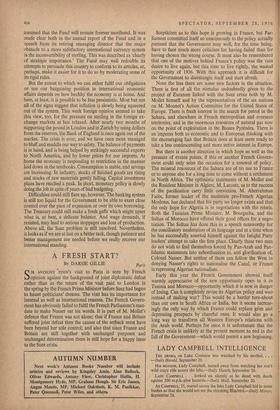A FRESH START?
IR ANTHONY EDEN'S visit to Paris is seen by French L./ opinion against the background of joint diplomatic defeat rather than as the return of the visit paid to London in the spring by the French Prime Minister before Suez had begun to haunt politicians' dreams. The visit has its importance for internal as well as international reasons. The French Govern- ment has obviously failed to fulfil the French Parliament's man- date to make Nasser eat his words. It is part of M. Mollet's defence that France was not alone; that if France and Britain suffered joint defeat then the causes of the setback must have been beyond her sole control; and also that since France and Britain are still together with unchanged purposes and unchanged determination there is still hope for a happy issue to the Suez crisis. Scepticism as to this hope is growing in France, but Par- liament committed itself so unanimously to the policy actually pursued that the Government may well, for the time being, have to face much more criticism for having failed than for having chosen the wrong course. It must also be remembered that one of the motives behind France's policy was the vain desire to live again, but this time to live rightly, the wasted opportunity of 1936. With this approach it is difficult for the Government to disentangle itself and start afresh.
None the less there are some new factors in the situation. There is first of all the stimulus undoubtedly given to the project of Euratom linked with the Suez crisis both by M. Mollet himself and by the representatives of the six nations on M. Monnet's Action Committee for the United States of Europe. There is fresh interest in the search for petrol in the Sahara, and elsewhere in French metropolitan and overseas territories, and in the enormous resources of natural gas now on the point of exploitation in the Basses Pyrenees. There is an impetus both to economic and to European thinking with the encouraging fact that Britain does at least seem ready to take a less condescending and more active interest in Europe.
But there is another direction in which hope as well as the pressure of events points, if this or another French Govern- ment could only seize the occasion for a renewal of policy. The mineral resources of the Sahara are of no use to France or to anyone else for a long time to come without a settlement in North Africa. The optimistic statements of M. Mollet and the Resident Minister in Algiers. M. Lacoste, as to the success of the pacification carry little conviction. M. Aberrahman Fares, former leader of the moderate pro-French Algerian Moslems, has declared that his party no longer exists and that the only hope for Algeria is in negotiations with the rebels. Both the Tunisian Prime Minister, M. Bourguiba, and the Sultan of Morocco have offered their good offices for a nego- tiation. The Sultan has done this in a speech noteworthy for the conciliatory moderation of its language and at a time when he has successfully asserted himself against the Istiqlal Party leaders' attempt to take the first place. Clearly these two men do not wish to find themselves forced by Pan-Arab and Pan- Islamic statements into subordination to, and glorification of, Colonel Nasser. But neither of them can follow the West in denying Nasser's rights to nationalise the Canal, or France in repressing Algerian nationalism.
Early this year the French Government showed itself warmly appreciative of the new opportunity open to it in Tunisia and Morocco—opportunity which it is now in danger of losing. Can it completely revise its Algerian policy and woo instead of making war? This would be a harder turn-about than our own in South Africa or India, but it seems increas- ingly the only way by which France could replace grim and depressing prospects by cheerful ones. It would also go a long way to transform all Western Europe's relations with the Arab world. Perhaps for once it is unfortunate that the Fretich crisis is unlikely at the present moment to end in the fall of the Government—which would permit a new beginning.


































 Previous page
Previous page